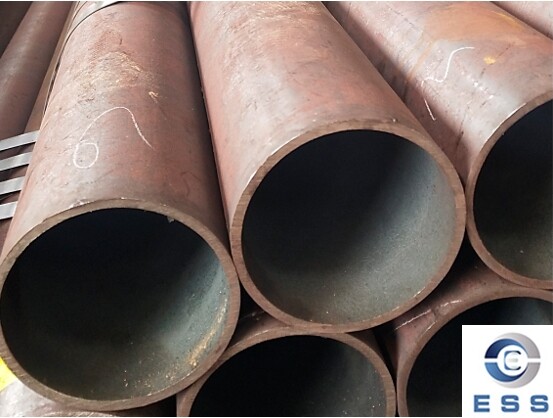
How do beginners identify the quality of
the carbon steel seamless
pipe?
To identify the quality of carbon steel
seamless pipes, you can start from the following aspects:
1. Appearance inspection
Observe the surface of the steel pipe,
which should be smooth, without cracks, folds, scars, delamination and other
defects. If there are obvious scratches, pits or rust on the surface, it may
affect the service life and performance of the steel pipe.
Check the ends of the steel pipe, which
should be flat, free of burrs and flash. If the ends are not flat, it may cause
damage during processing or use.
Check the color of the steel pipe.
Generally, the color of carbon steel seamless pipes is silver-white or
gray-white. If the color is abnormal, it may have been specially treated or
have quality problems.
2. Dimensional accuracy
Measure the outer diameter, wall thickness
and length of carbon steel seamless pipes, which should meet the requirements
of national standards or relevant specifications. Excessive deviation may
affect the installation and use of steel pipes.
Use calipers, micrometers and other tools
to measure and ensure the accuracy of the size. At the same time, the roundness
of the steel pipe can also be checked. The smaller the roundness deviation, the
better the quality.
For some steel pipes with special
requirements, such as high-precision steel pipes, more rigorous dimensional
measurement and inspection are required.
3. Material quality
The main material of carbon steel seamless
pipes is carbon steel, which should have good mechanical and chemical
properties. The quality of the material can be determined by checking the
material certificate of the steel pipe or performing chemical composition
analysis.
Check the hardness of the steel pipe. The
hardness should meet the requirements. Too high or too low hardness may affect
the performance of the steel pipe. Generally speaking, hardness can be measured
by a hardness tester.
Observe the metallographic structure of the
carbon steel seamless pipe. The metallographic structure should be uniform and
dense, without obvious defects such as segregation and inclusions. The quality
of the metallographic structure directly affects the mechanical properties and
corrosion resistance of the steel pipe.
4. Pressure resistance
Carrying out pressure resistance test is
one of the important methods to test the quality of carbon steel seamless
pipes. The two ends of the steel pipe can be sealed, and then a certain
pressure of liquid or gas can be injected to observe the deformation and
leakage of the steel pipe under pressure.
The pressure of the pressure test should
meet the relevant standards or design requirements, and the test time should be
long enough to ensure that the steel pipe can withstand the design pressure
without leakage or rupture.
If the pressure test fails, it means that
there is a problem with the quality of the steel pipe and it cannot be used.
5. Nondestructive testing
Nondestructive testing methods can be used
to detect whether there are defects inside the carbon steel seamless pipe, such
as cracks, slag inclusions, pores, etc. Commonly used nondestructive testing
methods include ultrasonic testing, magnetic particle testing, and penetration
testing.
Ultrasonic testing can detect defects
inside the steel pipe, and has the advantages of fast detection speed and high
sensitivity; magnetic particle testing is suitable for detecting surface and
near-surface defects, and has better effects on ferromagnetic materials;
penetration testing is suitable for detecting surface opening defects, and has
a high detection sensitivity.
Through nondestructive testing, defects
inside the steel pipe can be discovered in time to avoid accidents during use.
How can beginners choose high-quality
carbon steel seamless pipes?
When purchasing carbon steel seamless
pipes, you can consider the following aspects:
1. Material quality
The quality of the material directly
determines the service life, corrosion resistance and durability of the
seamless pipe. Therefore, it is necessary to choose pipes with good quality, no
obvious defects and unnecessary material retention. When purchasing, you can
ask the supplier to provide relevant quality inspection reports to ensure that
the quality of the pipe meets the relevant standards.
2. Specifications and models
The correspondence of specifications and
models is very important, and the size requirements are usually relatively
high. It is necessary to select the appropriate outer diameter, wall thickness
and length according to the actual project requirements. At the same time, it
is necessary to ensure that the carbon steel seamless pipe manufacturer can
formulate a suitable plan according to the requirements to avoid the impact on
the project due to unqualified material specifications.
3. Surface treatment
The surface treatment of carbon steel
seamless pipes cannot be ignored. Effective scrubbing and painting can enhance
its anti-oxidation and anti-corrosion properties, reduce the risk of damage and
extend its service life. Therefore, when choosing, you can pay attention to the
surface treatment of the pipe to ensure that it meets the requirements of use.
4. Cost considerations
The prices of different seamless
steel pipe sizes, materials, and specifications will vary. When purchasing,
you need to make a comprehensive consideration based on the budget and
performance requirements, and choose products with high cost performance.
In addition, the material
selection of seamless steel pipes is also a very important part. Low carbon
steel has good plasticity and toughness, suitable for general engineering
applications; medium carbon steel has high strength and is suitable for
mechanical parts manufacturing; high carbon steel has excellent hardness and
wear resistance, suitable for applications such as tools and bearings.
Therefore, when choosing the material, it needs to be determined according to
the specific use environment and requirements.













 Eastern Steel Manufacturing Co.,Ltd not only improve product production and sales services, but also provide additional value-added services. As long as you need, we can complete your specific needs together.
Eastern Steel Manufacturing Co.,Ltd not only improve product production and sales services, but also provide additional value-added services. As long as you need, we can complete your specific needs together.










